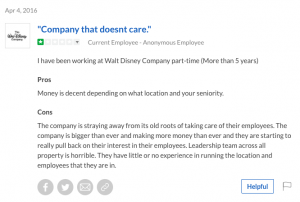
Unless you know someone at a company that’s hiring, it can be difficult to know what it’s actually like to work there. Sites like Glassdoor offer a rare, unfiltered view into salary levels, management, culture, and other things that the company’s external facing website and communications tend to obscure.
Reviewing your employer on Glassdoor can be risky because it could lead to negative repercussions from your employer. The reviews are public and other people, including your employer, may be able to see them. If your employer does not agree with your review, it could lead to disciplinary action or even termination. Additionally, the review could be seen as a form of defamation, which is illegal.
On the contributor side, it’s satisfying to vent your frustration about your terrible department head or never-present CEO, knowing your review of the company is anonymous. Or is it?
Much to the chagrin of Glassdoor users everywhere, a federal court decided in a closed proceeding that Glassdoor reviewers are not entitled to anonymity and that the government can compel the company to provide users’ information. The court’s reasoning was that the reviews are not political speech and are therefore not protected.
To offer some context, the federal government had launched an investigation into one company’s contract practices. After finding some reviews about the subject company on Glassdoor, the government obtained a subpoena to obtain the names the anonymous reviewers who had posted about the company under investigation. When Glassdoor refused to supply the names, the court considered whether the reviewers were entitled to anonymity. (Read about the case in greater detail.)
The court ultimately decided that, no, Glassdoor reviews are not anonymous.
Your anonymity is not guaranteed
I question whether this reasoning will hold up on appeal. Political speech is not the only kind of speech entitled to protection. Labor laws have protected employees from retaliation for posting on Facebook and other social networks about working conditions and management practices. To me, Glassdoor reviews are more akin to this type of speech than political speech.
But I’m afraid the damage is done. Once anonymity is not guaranteed, people become reluctant to share their true opinion of a company (good or bad). No one wants to get dragged into someone else’s legal problems, especially after you’re no longer employed at the company being sued or investigated.
Once people hear about this decision, they’ll be less likely to post on review sites like Glassdoor. This, in turn, has a chilling effect on speech and inhibits job seekers’ ability to see past the PR spin and get a true assessment of what it’s like to work at a particular company. That’s a shame, but since there’s no clear benefit to the person posting to counterbalance the risk, I can’t imagine many people would post reviews after this.
The new Glassdoor posting reality
If you do elect to post to Glassdoor, I recommend that you limit your comments to former employers. You might work for a taskmaster, but think how much worse it would be if he knew you called her “Attila the Hun” behind her back. Much better to save that kind of “constructive feedback” for when that job’s in your rear view mirror.
As much as I value candid reviews about products, service providers, and workplaces, I wouldn’t expect anyone to risk their job or reputation posting to a site like Glassdoor when their anonymity is not guaranteed.
Rules to better posting
In order to protect yourself from unintended consequences, follow the advice sometimes attributed to Buddha. Before you speak (or post), as yourself three questions about what you’re planning to say:
- Is it true?
- Is it kind?
- Is it necessary?
Posting a review is never going to pass that third threshold. Also, Glassdoor reviews don’t seem at all helpful for the contributor, although they benefit many site users that the contributor will never meet.
Not much of a trade-off for exposing yourself to risk.
Remember, you can always meet up with an acquaintance to dish about your former company if they’re thinking of applying there. And doing someone this type of favor benefits both parties: they get an accurate picture of the company culture and you build trust and perhaps get a reciprocal favor in return someday.
That’s a much better deal than posting to Glassdoor. An added benefit is that there’s no online record of what you said, so there’s far less chance your comments will be published out of context or wind up in a federal investigator’s file.
So dish. Just do it in private!

Kerry O’Shea Gorgone is a writer, lawyer, speaker and educator. She’s also Director of Product Strategy, Training, at MarketingProfs. Kerry hosts the weekly Marketing Smarts podcast. Find Kerry on Twitter.
Illustration marked safe for re-use by Unsplash.com



